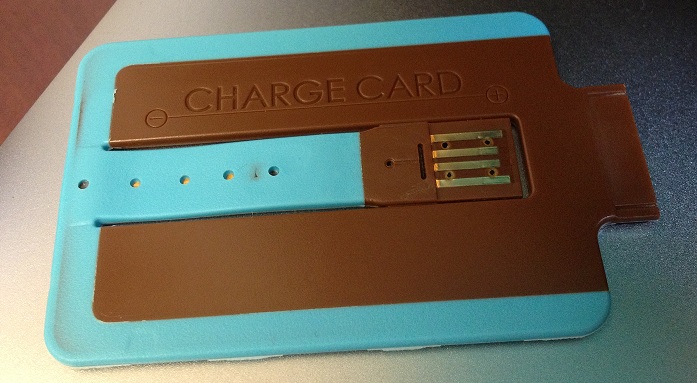When Kickstarter Works, It’s Rewarding and Potentially Addictive
This week I received a nerdy delivery: The ChargeCard, a blue-and-brown plastic iPhone charger the dimensions of a chubby credit card that I and over 5,400 others backed on Kickstarter some months ago.

I’ve backed several Kickstarter projects, but this was the first tech-related one, and only the second involving a physical reward. I supported it because I’m always searching for an iPhone charger, and it made sense to have one I could just stow in my wallet. It felt really good to open up that envelope and get my hands on the result of the creators’ efforts and financial pledges of so many anonymous strangers, including me.
The ChargeCard isn’t the most beautifully designed product I’ve ever seen (imperfections in the color and little perforations in the plastic make it look more like an advanced prototype than a final product), but that hardly matters. What does matter is that it fits in my wallet and works perfectly, and its arrival was heralded by frequent, clear communication from the two people behind the project about what stage they were at in the production process and when the devices would be in backers’ hands. It was so popular, raising over three times its $50,000 goal, that versions are now going to be produced for iPhone 4, 4s, and 5, as well as gadgets that charge via Micro USB.
The whole experience left me impressed at how quickly we’ve moved from being passive consumers to having a voice in what comes to market. I’m excited to back more projects, and tech projects in particular, to keep this trend growing.
Keep Reading
Most Popular
Large language models can do jaw-dropping things. But nobody knows exactly why.
And that's a problem. Figuring it out is one of the biggest scientific puzzles of our time and a crucial step towards controlling more powerful future models.
How scientists traced a mysterious covid case back to six toilets
When wastewater surveillance turns into a hunt for a single infected individual, the ethics get tricky.
The problem with plug-in hybrids? Their drivers.
Plug-in hybrids are often sold as a transition to EVs, but new data from Europe shows we’re still underestimating the emissions they produce.
Stay connected
Get the latest updates from
MIT Technology Review
Discover special offers, top stories, upcoming events, and more.